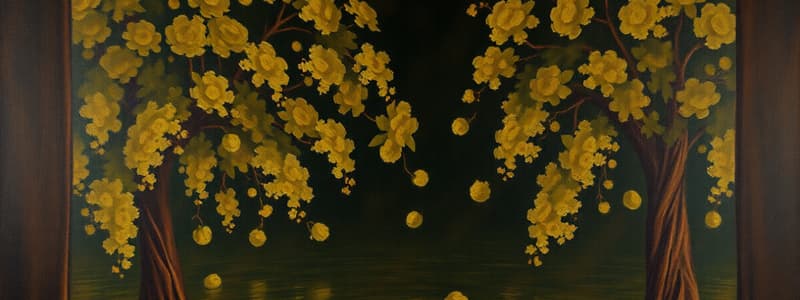Podcast
Questions and Answers
What is the primary purpose of history as a subject in art?
What is the primary purpose of history as a subject in art?
- To depict inanimate objects
- To express emotions through color and form
- To create fantastical imagery
- To teach lessons about past events (correct)
Which subject in art depicts natural scenery such as mountains and rivers?
Which subject in art depicts natural scenery such as mountains and rivers?
- Portraiture
- Still life
- Abstract
- Landscape (correct)
What does conventional meaning in art refer to?
What does conventional meaning in art refer to?
- The general interpretations using symbols and signs (correct)
- The most rudimentary level of meaning
- The artist's personal experience related to the artwork
- The emotional response of the artist
Which subject is characterized by the depiction of gods and goddesses?
Which subject is characterized by the depiction of gods and goddesses?
What type of art is Jackson Pollock's Number 1A considered?
What type of art is Jackson Pollock's Number 1A considered?
What level of meaning in art focuses on recognizable forms and their relationships?
What level of meaning in art focuses on recognizable forms and their relationships?
Which subject is an arrangement of inanimate objects considered?
Which subject is an arrangement of inanimate objects considered?
Dreams and Fantasy as subjects in art aim to express what aspect of human experience?
Dreams and Fantasy as subjects in art aim to express what aspect of human experience?
What is a characteristic feature of Pointillism as a painting technique?
What is a characteristic feature of Pointillism as a painting technique?
What distinguishes Pop Art from traditional fine art?
What distinguishes Pop Art from traditional fine art?
Which statement best describes Realism in art?
Which statement best describes Realism in art?
What is the primary focus of Surrealism as an art movement?
What is the primary focus of Surrealism as an art movement?
What fundamental belief does Suprematism convey about art?
What fundamental belief does Suprematism convey about art?
What aspect of art do subjective meanings primarily relate to?
What aspect of art do subjective meanings primarily relate to?
Which of the following best defines 'texture' in the context of art?
Which of the following best defines 'texture' in the context of art?
Which of the following is NOT typically considered an element of art?
Which of the following is NOT typically considered an element of art?
What distinguishes an artist from an artisan?
What distinguishes an artist from an artisan?
Which term describes the distance or area around an object in art?
Which term describes the distance or area around an object in art?
Why are artists considered significant to human civilization?
Why are artists considered significant to human civilization?
How does an artisan typically differ from an artist?
How does an artisan typically differ from an artist?
What role does the concept of 'line' play in elements of art?
What role does the concept of 'line' play in elements of art?
What is the primary characteristic of indirect functional art?
What is the primary characteristic of indirect functional art?
Which type of artwork would be classified as representational art?
Which type of artwork would be classified as representational art?
What does personal function in art primarily focus on?
What does personal function in art primarily focus on?
How does art play a role in society?
How does art play a role in society?
What is the main goal of art therapy?
What is the main goal of art therapy?
Which type of art does not refer to any real-world objects or events?
Which type of art does not refer to any real-world objects or events?
What can be implied about the subject of an artwork?
What can be implied about the subject of an artwork?
What distinguishes fine arts from functional arts?
What distinguishes fine arts from functional arts?
What does Ang Kiukok's painting Fishermen symbolize?
What does Ang Kiukok's painting Fishermen symbolize?
Which art form uses the human body as its medium?
Which art form uses the human body as its medium?
Which depicted structure is recognized as the largest mosque in the Philippines?
Which depicted structure is recognized as the largest mosque in the Philippines?
What classification of art refers to objects that serve practical purposes?
What classification of art refers to objects that serve practical purposes?
What does the Oblation statue symbolize?
What does the Oblation statue symbolize?
Which musical piece is considered the biggest OPM international hit?
Which musical piece is considered the biggest OPM international hit?
What is the primary method used in motion pictures to create the illusion of movement?
What is the primary method used in motion pictures to create the illusion of movement?
Which form of art is defined by its use of actors on a stage to express a story?
Which form of art is defined by its use of actors on a stage to express a story?
Study Notes
Forms of Art
- Painting: Art form involving pigments on a flat surface, creating meaningful effects. Example: Ang Kiukok's "Fishermen" portrays fishermen's struggle and hope, with a crimson sun signifying perpetual energy.
- Sculpture: Designing and constructing 3D forms representing natural objects or imaginary shapes. Example: Guillermo Tolentino's "The Oblation," a concrete statue symbolizing a selfless offering to the University of the Philippines, depicts a man with outstretched arms facing upward.
- Architecture: Art form involving designing and constructing buildings and structures. Example: The Sultan Haji Hassanal Bolkiah Mosque (Grand Mosque of Cotabato), the largest in the Philippines, funded by Brunei's Sultan Hassanal Bolkiah and designed by architect Felino Palafox.
- Music: Combines and regulates sounds of varying pitch to produce compositions expressing ideas and emotions. Example: "Anak," the most iconic Filipino song, is considered the biggest OPM international hit.
- Dance: Uses the human body as its medium. Example: Singkil, a dance from the Maranao people, retells the rescue of Princess Gandingan by Prince Bantugan from a diwata (spirit).
- Theater: Drama or play where actors recreate a story on a stage for an audience. Example: "Ang Huling El Bimbo" narrates a story of friendship through the songs of a popular Pinoy rock band from the '90s.
- Motion Picture: Projects a series of images rapidly on a screen creating the illusion of movement.
Functions of Art
- Directly Functional Art: Serves practical purposes like architecture, woven fabrics, and furniture, while exhibiting aesthetic qualities and fulfilling basic human needs.
- Indirectly Functional Art: Art perceived through the senses, such as painting, sculpture, music, etc., holds no practical purpose, valued for their intellectual, emotional, or aesthetic worth.
- Personal Function: Art that holds personal significance, expressing or reflecting individual feelings, experiences, or identities.
- Social Function: Integral to society, influencing every aspect of social life.
- Physical Function: Art objects that enhance physical comfort. Functional art might be a tool or container.
- Therapeutic Function: Art and music have therapeutic benefits, offering ways to manage emotions, increase self-awareness, reduce stress and anxiety, and provide new perspectives.
Subject and Content in Art
- Subject is the visual focus or image extracted from an artwork, answering "what" in art.
- Representational Art: Depicts real-world objects or events. Also termed figurative art, where figures are easily identifiable. Example: Leonardo da Vinci's "Mona Lisa" (1503).
- Non-Representational Art: Does not refer to the real world. Focuses on visual elements like shapes, lines, and colors to convey feelings, emotions, and concepts. Example: Jackson Pollock's abstract painting "Number 1A" (1948).
Types of Art Subjects
- Still Life: Compilation of inanimate objects arranged together.
- History: Depiction of factual events from the past, used for remembrance or teaching.
- Religion: Art serves as a handmaid of religion.
- Mythology: Stories of deities from various cultures, depicting present-day human behaviors.
- Dreams and Fantasy: Expresses the wonders of the unconscious. Artworks aim to explain their content, including hidden meanings.
- Landscape: Depiction of natural scenery like mountains, cliffs, rivers, etc.
- Nature: Concentrated view or interpretation of specific natural elements.
- Portraiture: Image of a specific person, animal, or group.
- Abstract: Non-representational artwork, using color, shape, line, form, texture, and pattern to create a visual representation of ideas and feelings.
Content in Art
- Content is the meaning or message conveyed by the artist, answering "why" in art.
- Factual Meaning: Most basic level of meaning, derived from recognizable forms and their relationships.
- Conventional Meaning: Interpreted using motifs, symbols, signs, and other ciphers as base for meaning.
- Subjective Meaning: Meaning stemming from the viewer's individual experiences, perspectives, and values.
Elements of Art
- Line: Mark on a surface with length and direction, created by a tool (pencil, pen, brush).
- Color: Consists of hue, intensity, and value (lightness or darkness).
- Space: Distance or area between, around, above, below, or within things.
- Positive Space: The object itself.
- Negative Space: The space around the object.
- Foreground, Middle Ground, Background: Creates depth.
- Texture: Surface quality or "feel" of an object. Can be actual or implied.
Artist and Artisan
- Artist: Expresses their feelings, emotions, and perceptions of the world through various materials in visual arts. Their expression can be seen in painting, drawing, sculpture, and other forms.
- Artisan: Skilled worker who makes objects by hand, ranging from furniture to jewelry. Artisan objects possess both functional and decorative value.
Art Movements
- Pointillism: Painting technique using tiny dots ("points") of pure color applied in patterns to form an image.
- Pop Art: Inspired by popular imagery and products from commercial culture.
- Post-Impressionism: A reaction against Impressionism's naturalistic depiction of light and color.
- Realism: Reaction against Romanticism, presenting both good and bad, beautiful and ugly in an unembellished manner.
- Rococo: Style characterized by elaborate ornamentation and a light, sensuous style in architecture and decorative art.
- Surrealism: Liberates thought and human experience from rationalism, championing the irrational and poetic.
- Suprematism: Abstract art movement that expressed in the simplest geometric forms, believing it superior to representational art.
Studying That Suits You
Use AI to generate personalized quizzes and flashcards to suit your learning preferences.
Related Documents
Description
Explore the diverse forms of art including painting, sculpture, architecture, and music. Discover significant examples that illustrate each art form, like Ang Kiukok's 'Fishermen' and the Grand Mosque of Cotabato. This quiz will enhance your understanding of how these forms express ideas and emotions.




